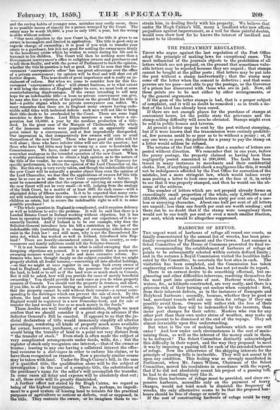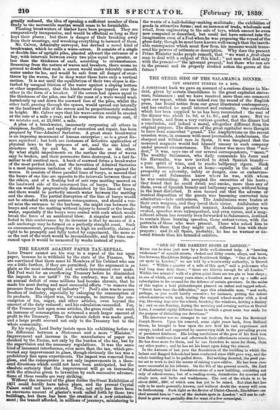HARBOURS OF REFUGE.
THE urgent want of harbours of refuge all round our coasts, as fatally demonstrated by the annual list of wrecks, has been prac- tically recognized by Parliament and the Crown. Last summer a Select Committee of the House of Commons presented its final re- port, recommending the establishment of harbours of refuge at points to be subsequently selected within certain defined limits ; and in the autumn a Royal Commission visited the localities indi- cated by the Committee, to ascertain the best sites in each. The visitation has been completed, and the Commission has taken engineering evidence in London, but has not yet made its report.
There is an earnest desire to do something effectual, but en- gineering and other difficulties intervene, resolving themselves for the most part into questions of cost. Harbour works, break- waters, &o., as hitherto constructed, are very costly, and there is a grievous risk of their turning out useless when completed : first, from their inherent defects, as in the instances of Ramsgate and Holyhead harbours ; secondly, because, whether they be good or bad, merchant vessels will not use them for refuge if they can possibly avoid them. Owners will rather risk the loss of their ships, for which they will be indemnified by the insurers, than incur port charges for their safety. Masters who run for any other port than their own under stress of weather, may make up their account to be dismissed at the end of the voyage. They act almost invariably upon this understanding. But what is the use of making harbours which no one will enter ? And how under such circumstances is the cost of main- taining them, as well as the interest of the money sunk in them
to be d.efrayed ? The Select Committee distinctly acknowledged this difficulty in their report, and the way they proposed to meet it was by imposing a passing toll for each of the intended harbours of refuge. Now the abhorrence of the shipping interests for the principle of passing tolls is invincible. They will not assent to it upon any condition. This feeling was so strongly manifested in Parliament, when Mr. James Wilson, Chairman of the Select Committee, moved his resolutions in accordance with the report, that if he did not absolutely recant his project of a passing toll, fc he had to do something very like it. Since then harbours of refuge must be provided, and since ex- pensive harbours, accessible only on the payment of heavy charges, would not tend much to diminish the frequency of wrecks, the only alternative seems to be that the proposed har- bours should be free of charge or nearly so. If the cost of constructing harbours of refuge could be very
greatly reduced, the idea of opening a sufficient number of them freely to the mercantile marine would cease to be formidable.
Floating breakwaters of timber have been proposed. They are comparatively inexpensive, and would be effectual so long as they kept their places ; but there is danger of their breaking away from their moorings, and wrecking everything to leeward of them. Mr. Calver, Admiralty surveyor, has devised a novel kind of breakwater, which he calls a wave-screen. It consists of a single or double line of upright piles, planted athwart the entrance of a bay, with intervals between every two piles equal to, greater, or less than the thickness of each, according to circumstances. Reasoning from the nature of waves and breakers, there seems no ground to doubt that such a screen would make tolerably smooth water under its lee, and would be safe from all danger of over- throw by the waves, for in deep water these have only a vertical motion. It is not until the equilibrium of their two slopes is dis- turbed by unequal friction of the water against a sloping bottom or other impediment, that the hindermost slope topples over the other in the form of a breaker. If the screen had spaces equal to the thickness of the piles, one half the mass of a wave would wash harmlessly up and down the seaward face of the piles, whilst the other half, passing through the spaces, would spread out laterally, on the landward side of the screen and be proportionately reduced in height. Mr. Calver says that his wave-screen could be erected at the rate of a mile a year, and he computes its average cost, if we mistake not, at 22,0001. a mile.
A plan of a breakwater, immensely surpassing all others in cheapness, facility, and rapidity of execution and repair, has been proposed by Vice-Admiral Sartorius. A great stone breakwater is an imposing monument of human enterprise ; so is a great Ro- man aqueduct ; but both are instances of defective application of physical laws to the purposes of art, and the one kind of structure will, by and by, be as obsolete as the other. By what slight impediments on the surface the crest of waves may be broken, and their percussive force destroyed, is a fact fa- miliar to all nautical men. A bank of seaweed forms a breakwater of the most perfect kind, and the invention of Admiral Sartorius is a most ingenious imitation of this natural barrier against the waves. It consists of three parallel lines of buoys, so moored that the buoys of one line are opposite to the intervals between those of the others, and of a floating bed of ooir rope matting moored on the landward side of the innermost line of buoys. The force of the sea would be progressively diminished by the lines of buoys, and there would be perfectly smooth water between the matting and the shore. The partial disruption of the line of buoys 'would not be attended with any serious consequences, and should a ves- sel miss the entrance to the harbour, she might run between the buoys and over the matting without injury to herself or the break- water, especially if the buoys were coated with cork which would break the force of an accidental blow. A. singular merit attri- buted to this contrivance by its inventor is that by means of it a safe anchorage may be formed on a perfectly straight coast. Such an announcement, proceeding from so high an authority, claims of right to be promptly and fully tested by experiment, the more so as the cost of the work would be inconsiderable, and the time con- sumed upon it would be measured by weeks instead of years.



























 Previous page
Previous page